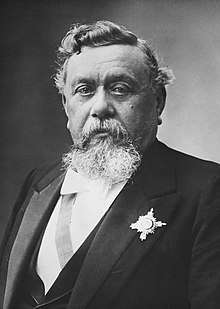Armand Fallières
Clément Armand Fallières (French pronunciation: [aʁmɑ̃ faljɛʁ]; 6 November 1841 – 22 June 1931) was a French statesman who was President of France from 1906 to 1913.
Armand Fallières | |
|---|---|
 | |
| President of France | |
| In office 18 February 1906 – 18 February 1913 | |
| Prime Minister | Maurice Rouvier Ferdinand Sarrien Georges Clemenceau Aristide Briand Ernest Monis Joseph Caillaux Raymond Poincaré Aristide Briand |
| Preceded by | Émile Loubet |
| Succeeded by | Raymond Poincaré |
| Prime Minister of France | |
| In office 29 January 1883 – 21 February 1883 | |
| President | Jules Grévy |
| Preceded by | Charles Duclerc |
| Succeeded by | Jules Ferry |
| Personal details | |
| Born | 6 November 1841 Mézin, France |
| Died | 22 June 1931 (aged 89) Lannes, France |
| Political party | Democratic Republican Alliance |
| Alma mater | University of Paris |
He was born at Mézin in the département of Lot-et-Garonne, France, where his father was clerk of the peace. He studied law and became an advocate at Nérac, beginning his public career there as municipal councilor (1868), afterwards mayor (1871), and as councillor-general of the department of Lot-et-Garonne (1871). Being an ardent Republican, he lost this position in May 1873 upon the fall of Thiers, but in February 1876 was elected deputy for Nérac. In the chamber he sat with the Opportunist Republican parliamentary group, Gauche républicaine, signed the protestation of 18 May 1877, and was re-elected five months later.
In 1880 he became under-secretary of state in the department of the interior in Jules Ferry's ministry (May 1880 to November 1881). From 7 August 1882 to 20 February 1883 he was minister of the interior, and for a month (from 29 January 1883) was prime minister. His ministry had to face the question of the expulsion of the pretenders to the throne of France, owing to the proclamation by Prince Napoléon (January 1883).
Fallières, who was ill at the time, was not able to face the storm of opposition, and resigned when the senate rejected his project. The following November, however, he was chosen as minister of public instruction by Jules Ferry, and carried out various reforms in the school system.[1]
He resigned in March 1885, becoming minister of the interior in Maurice Rouvier's cabinet two years later. He exchanged his portfolio in December for that of the department of justice. He returned again to the ministry of the interior in February 1889, and finally retook the department of justice from March 1890 to February 1892. In June 1890 his département (Lot-et-Garonne) elected him to the senate by 417 votes to 23. There Fallières remained independent of party struggles, although maintaining his influence among the Republicans.
In March 1899 he was elected president of the senate, and retained that position until January 1906, when he was chosen by a union of the groups of the Left in both chambers as candidate for the presidency of the republic. He was elected on the first ballot by 449 votes against 371 for his opponent, Paul Doumer.
Fallières was an outspoken opponent of the death penalty and commuted the sentences of many prisoners sentenced to death.
Fallières' ministry, 29 January 1883 – 21 February 1883
- Armand Fallières – President of the Council, interim Minister of Foreign Affairs, Minister of the Interior, and Minister of Worship
- Jean Thibaudin – Minister of War
- Pierre Tirard – Minister of Finance
- Paul Devès – Minister of Justice
- François de Mahy – Minister of Agriculture and interim Minister of Marine and Colonies
- Jules Duvaux – Minister of Public Instruction and Fine Arts
- Anne Charles Hérisson – Minister of Public Works
- Adolphe Cochery – Minister of Posts and Telegraphs
- Pierre Legrand – Minister of Commerce
References
| Wikimedia Commons has media related to Armand Fallières. |
- Chisholm, Hugh, ed. (1911). . Encyclopædia Britannica (11th ed.). Cambridge University Press.

External links
| Political offices | ||
|---|---|---|
| Preceded by René Goblet |
Minister of the Interior 1882–1883 |
Succeeded by René Waldeck-Rousseau |
| Preceded by Paul Devès |
Minister of Worship 1882–1883 | |
| Preceded by Charles Duclerc |
Prime Minister of France 1883 |
Succeeded by Jules Ferry |
| interim Minister of Foreign Affairs 1883 |
Succeeded by Paul-Armand Challemel-Lacour | |
| Preceded by Jules Ferry |
Minister of Public Instruction and Fine Arts 1883–1885 |
Succeeded by René Goblet |
| Preceded by René Goblet |
Minister of the Interior 1887 |
Succeeded by Ferdinand Sarrien |
| Preceded by Charles Mazeau |
Minister of Justice 1887–1888 |
Succeeded by Jean-Baptiste Ferrouillat |
| Preceded by François Thévenet |
Minister of Worship 1890–1892 |
Succeeded by Louis Ricard |
| Preceded by Édouard Locroy |
Minister of Public Instruction and Fine Arts 1889–1890 |
Succeeded by Léon Bourgeois |
| Preceded by Émile Loubet |
President of the Senate 1899–1906 |
Succeeded by Antonin Dubost |
| President of France 1906-1913 |
Succeeded by Raymond Poincaré | |